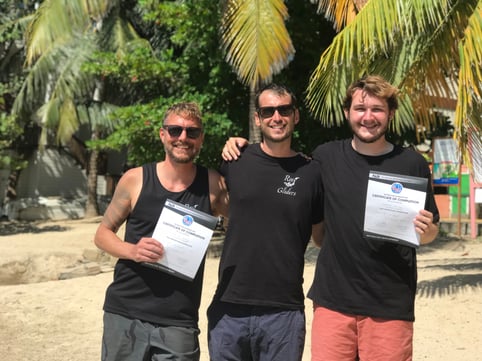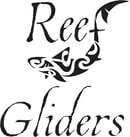Why Roatan is the perfect place for your PADI IDC
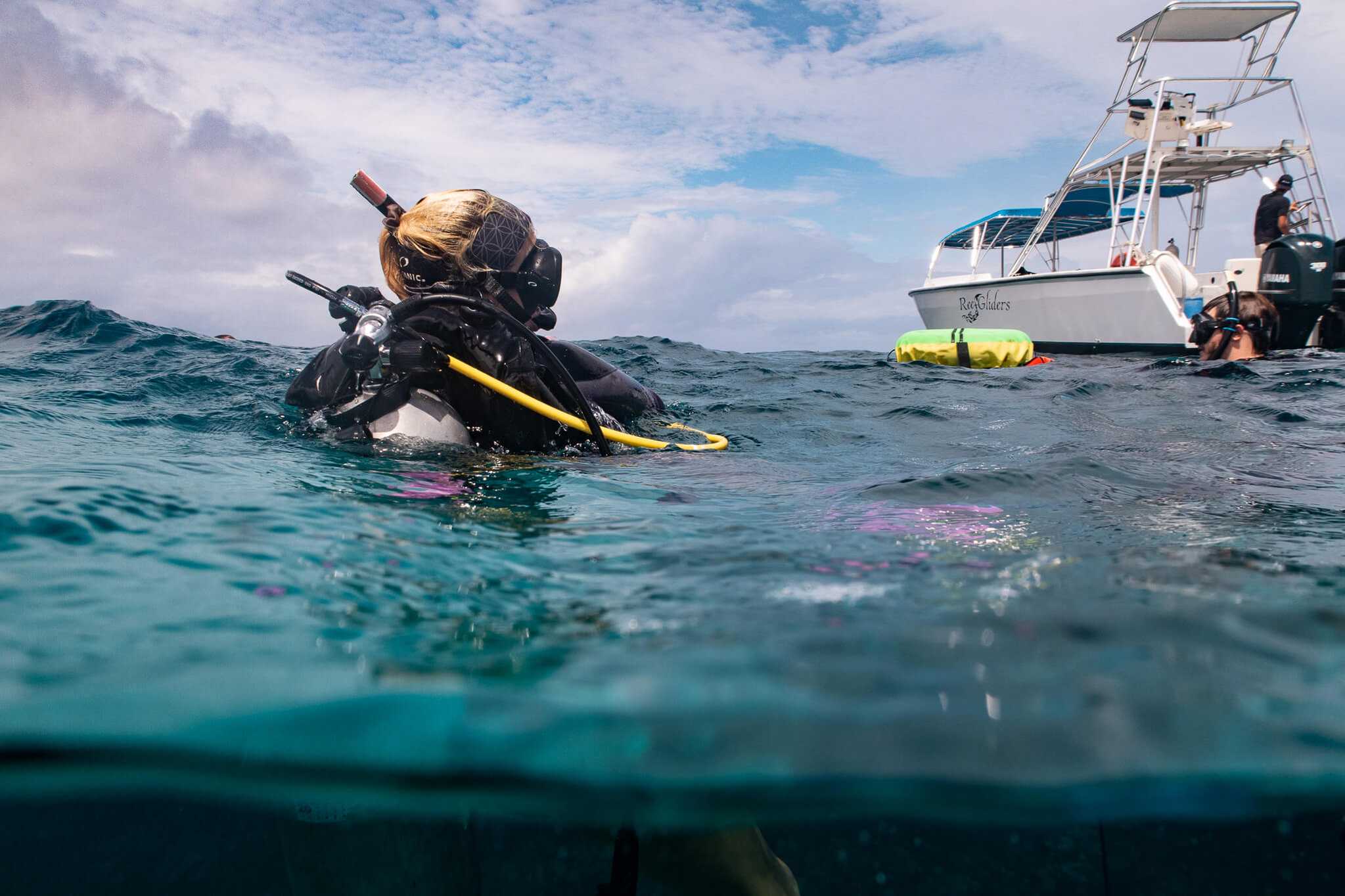
Where is best to take the PADI Instructor course? A question mused over by many a future dive instructor
The PADI Instructor Development Course (IDC) is the key stepping stone to a career in diving, and making the decision to ditch the 9-5 for sunshine, sand and compressed air is a no-brainer. But before you walk out the door, punching the air shouting ‘Carpe Diem!’, you have to know where (literally) on earth you’re going.
Now before we get ahead of ourselves, let's be frank, there's not one head-and-shoulders above the rest BEST place to do your IDC. The world has many great locations and instructor programs, and where is best for you is very subjective by nature. But if you don’t know where to start or are weighing up the options, we’ll talk about some of the things people consider, and why we think Roatan is a perfect place for your IDC.
The Water
‘Make the ocean your office!’ As the saying goes, and whilst the ocean isn’t an office (and neither do we wish to work in one, thank you very much), the sentiment is true. As a dive instructor you will be spending a lot of time underwater, and if you were going to design an ideal place to work, Roatan's reef would be a close shout.
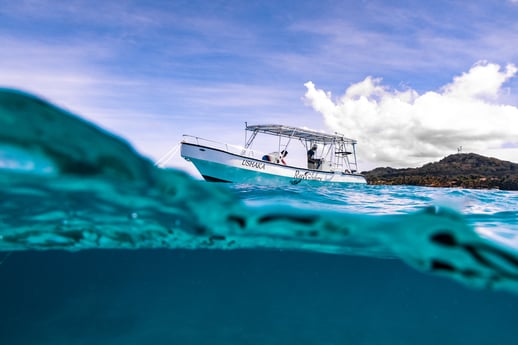
The island itself bursts out from the northern coast of Honduras and adjoins the southern section of the Mesoamerican reef system, which unites the Caribbean waters of Honduras, Guatemala, Belize and Mexico. The topography and marine life are diverse and offer something for every level of diver. From site to site you’ll notice dramatic differences from steep walls and drop-offs to shallow shelves and swiss cheese-like swim throughs. The marine life is in a very healthy condition and offers an array of tropical fish and critters for all persuasions, thanks in no small part to the continued efforts of the Roatan Marine Park. For the wreck lovers, we have two great sunken ships within 15 minutes of the dive centre, El Aguila and The Odyssey, the latter in particular is a perfect playground for our Wreck Instructor Training. The water doesn't really ever drop below 27 degrees celsius (80F), making the wetsuit choice normally something between “maybe a 3mm” to “just a swimsuit and a rash-guard today”. A lot of the time you’re in crystal clear, calm, turquoise water, with the expected fluctuations in visibility that weather can bring sometimes. When there's current, it's enough to give you an enjoyable push down the reef, but shouldn’t cause you to re-adjust your whole class because of it. In short, if you’re going to clock up hundreds or thousands of dives, Roatan is an excellent place to do so.
Starting your Diving Career
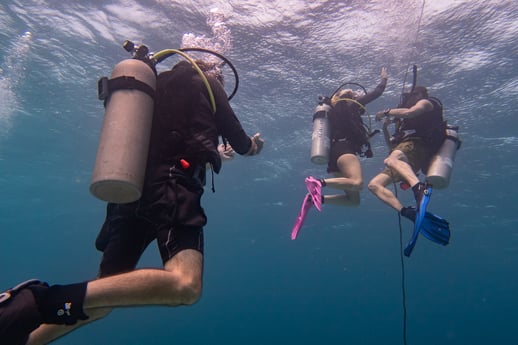 The Bay Islands of Honduras have over time, firmly established themselves as one of the go-to dive training hubs, and Roatan boasts the largest dive community amongst them. Whilst the bottom line is more dive shops means more demand for instructors, you’ll also want to think about the complexion of the area. Will you have to wait for a full time job or can you freelance? Is it all resort based tourism or more organic? Will you just be teaching courses or guiding as well?
The Bay Islands of Honduras have over time, firmly established themselves as one of the go-to dive training hubs, and Roatan boasts the largest dive community amongst them. Whilst the bottom line is more dive shops means more demand for instructors, you’ll also want to think about the complexion of the area. Will you have to wait for a full time job or can you freelance? Is it all resort based tourism or more organic? Will you just be teaching courses or guiding as well?
As you may have guessed from the title, Roatan covers pretty much all the bases. A big advantage is that not only do we have lots of dive centres, there's also a booming freelance community, and it’s common that many dive shops here look for freelancers in addition to their permanent staff. If you don’t land that full time job straight away, it’s a great way to start earning money and gaining experience, whilst becoming more integrated in the dive community as you’re waiting for the right long-term opportunity.
Work Balance
As you get in the swing of being a dive instructor you’ll likely find your niche, or at least you’ll figure out what parts you prefer to others. Many instructors prefer the teaching side, some prefer guiding, others passions lie in specialty areas like underwater photography or coral restoration.
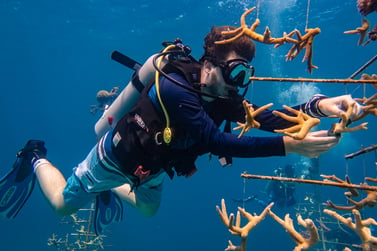
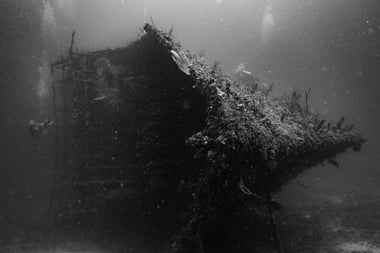
The instructors here are pretty spoiled when it comes to diversity, as Roatan attracts lots of training activities as well as fun divers, meaning instructors can have a really varied workload. At Reef Gliders we like to focus more on teaching recreational courses, divemaster mentoring and specialties like wreck and nitrox, but we still have our fair share of fun divers as well. As you gain more experience you will naturally shape your careers more in the direction you want to go. So it's important to think of what the area can offer you in the long term, not just the immediate.
Extracurricular
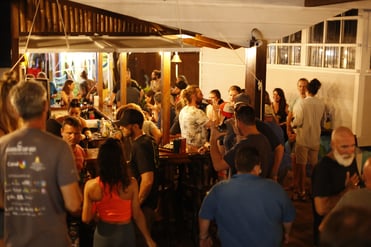 As for the area, we’re based in Roatan's West End which is full of independent dive shops, bars and restaurants. When your study is done for the day you’ll find numerous places to unwind, like West Ends classic Blue Marlin for a sunset beer, or a cocktail at Roatan's newest lounge bar Seawiches, or the Sundowners bar.
As for the area, we’re based in Roatan's West End which is full of independent dive shops, bars and restaurants. When your study is done for the day you’ll find numerous places to unwind, like West Ends classic Blue Marlin for a sunset beer, or a cocktail at Roatan's newest lounge bar Seawiches, or the Sundowners bar.
With the array of different places on offer you’re sure to be entertained, though please save your more adventurous nights for before or after the IDC.
The World View
As Covid smashed its way through the heart of the dive industry, the fall out and recovery throughout the world is still an ongoing process. Thankfully for the Bay Islands, the road to recovery has been much faster than elsewhere. The initial impact was abrupt and caused complete a cessation with the initial lockdown, but by late 2020 Roatan was starting to rebuild and the divers started to return. Ultimately when you turn your career to diving, you’re in the tourist business, and so the swings of global events will play their part, with all the highs and lows that that brings.
Luckily this corner of the world has proven to be as robust as it could be, with diver numbers here now back to pre-pandemic levels and entry/exit requirements for Honduras are as simple as could be expected, the future here is bright.
